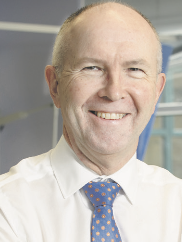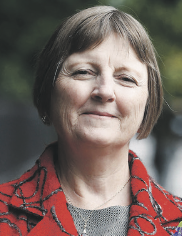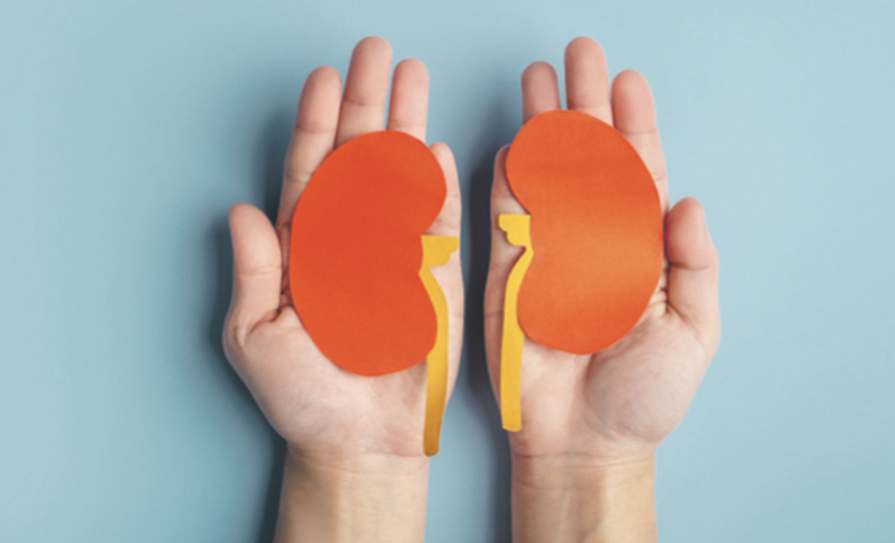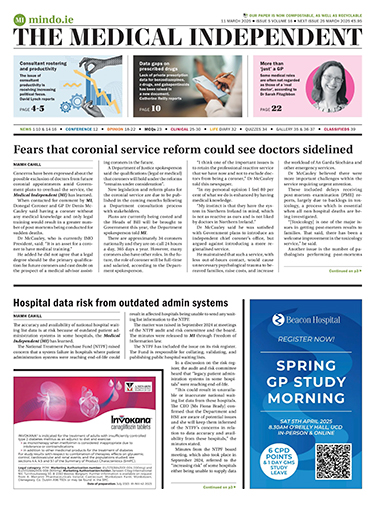There is an urgent need for comprehensive action by policymakers to address the growing burden of kidney disease. Catherine Reilly reports
Ireland has no national model of care for renal disease or HSE clinical programme comparable to those operational in many other disease areas.
Yet an estimated 500,000 people in Ireland are living with chronic kidney disease (CKD), which is rising in prevalence.
Ireland is not alone in this challenge. In June, a health economics analysis, commissioned by Kidney Research UK, described the situation as a pending “public health emergency”. Aging populations and risk factors, such as diabetes, hypertension, and cardiovascular disease, are contributing to increasing incidence.
Earlier intervention will deliver better health outcomes and reduce economic costs, heard Oireachtas members at a special briefing last month. The cost of dialysis alone is over €300 million annually.
The briefing session heard from professionals working in nephrology and audit, as well as patient representatives. It was led by the Irish Kidney Association (IKA) and hosted by Fine Gael spokesperson on health Deputy Colm Burke..

Prof George Mellotte
During the session, Prof George Mellotte, Clinical Lead of the HSE National Renal Office (NRO), emphasised the need to include CKD in the chronic disease management programme in general practice, where cases are being detected.
This issue was also covered in the five key actions that the IKA advocated to policymakers: Embed screening and treatment (including conservative care) for CKD in all chronic disease programmes; enhance a transitional service for teenagers moving to adult services; protect theatre and bed space for donation and transplant; provide for timely completion of required healthcare ahead of transplant and living donation; and implement an annual potential donor audit (see panel).
Overview
CKD is often asymptomatic at earlier stages and is associated with an increased risk of cardiovascular disease and premature death.
Where CKD goes undetected and untreated, there is a greater risk of progression to end-stage kidney disease (ESKD). Last year, there were around 2,500 people dialysing and 2,700 people living with a kidney transplant.
An extra 134 people were treated by dialysis last year, which was equivalent to the demand for two additional satellite dialysis units, Prof Mellotte informed the Oireachtas session.
Currently, home dialysis therapies are accessed by only about 12 per cent of patients, he outlined. The barriers include financial costs (eg, additional electricity costs), absence of incentives and targets for hospitals, insufficient patient education and support, and the lack of an assisted home dialysis programme.
Kidney transplantation is the preferred treatment for ESKD, offering improved survival and quality-of-life for patients, and substantial cost savings for the State.
In 2022, there were 130 deceased donor kidney transplants and 33 living donor transplants (compared with 104 and 35 in the previous year).
Some 512 people were on the kidney transplant waiting list at the end of last year, according to the National Kidney Transplant Service Annual Report 2022. The shortage of organs relative to the number of patients waiting for a transplant had remained “an ongoing challenge”, stated the report.
In 2022, the median time on dialysis prior to first transplant was 35 months (21 months for those who received a living donor transplant; 39 months for those who received a deceased donor transplant).
The median time on the kidney transplant waiting list was 26 months (15 months for those who received a living donor transplant; 31 months for those who received a deceased donor transplant).
Early identification
The structured chronic disease management programme in general practice has three elements: Opportunistic case finding (OCF) (aimed at identifying undiagnosed chronic diseases and people at high risk); an annual prevention review and a treatment programme for specified chronic diseases. The programme is available to adults with medical/GP visit cards (the treatment programme has rolled out to adults over 18; the OCF and prevention programmes have rolled out to adults over 45).
A HSE spokesperson said 11.5 per cent of patients enrolled in the chronic disease management treatment programme also have CKD.
“If unmanaged, CKD can lead to cardiovascular events, such as heart attacks, strokes, and kidney failure, with dialysis or kidney transplant implications. The HSE developed a business case for 2024 funding to include CKD and other less common, high-risk cardiovascular conditions (such as familial hypercholestrolaemia, peripheral vascular disease, and valvular disease) in the next phase of the CDM programme.
“Unfortunately, no further development funding was made available for 2024, but the HSE does intend to resubmit the bid for the 2025 National Service Plan. It was calculated that inclusion of these conditions in the CDM programme, in addition to improved health, could save 2,278 admissions, 9,278 bed days, 3,834 emergency department visits, and 26,047 outpatient department visits. This equates to a saving in monetary terms of over €17 million, compared to a cost of €7 million.”
Negotiation
An IMO spokesperson said its understanding is that CKD is among the future programme enhancements being considered.
“Any such developments will be subject to negotiation and agreement with the IMO and we have not been approached in relation to discussions on further enhancements to date,” the spokesperson told the Medical Independent (MI).
The union stated it is focussed on the latest developments (ie, the recent inclusion of hypertension stage one, gestational diabetes, and pre-eclampsia, in the prevention programme.)
Pathways
Currently, there is no structured care pathway for patients detected with less severe forms of CKD through the chronic disease programmes (they may be referred to nephrology waiting lists if deemed necessary). There are ICGP guidelines in place for diagnosis and management of CKD in primary care.
Prof Mellotte, a Consultant Nephrologist at St James’s Hospital and Tallaght University Hospital, Dublin, told MI that GPs must be empowered and supported to manage mild-to-moderate disease in the community.
Around 15 per cent of people aged over 50 have some degree of CKD, according to TILDA research. He said the epidemiological data indicates it will become “a major public health problem in the next 10-to-15 years”.
The development of a model of care is also important in the context of new drug indications. SGLT-2 inhibitors (initially developed for type 2 diabetes) have emerged as a treatment option in CKD and may stabilise or delay disease progression.
According to the European Medicines Agency, the following SGLT-2 medicines are approved for CKD in adults: Edistride and Forxiga, which both contain dapaglifozin, and Jardiance, which contains empagliflozin.
In July 2022, the National Centre for Pharmacoeconomics completed a rapid review assessment of Forxiga for treatment of CKD. It recommended that the HSE consider “not providing” this medicine unless it can agree a suitable price reduction with the pharmaceutical company.
The application for pricing and reimbursement of Forxiga for CKD remains under consideration within the HSE.
On 15 December, the Minister for Health stated that CKD would be among the clinical areas to benefit from funding for new medicines in 2024.
The use of SGLT-2 inhibitors in CKD is a “very rapidly moving field”, according to Prof Mellotte.
He said it is likely a subgroup of people with CKD will benefit and that a management and treatment plan will need to be devised for prescribing and monitoring. Clinicians will need to accrue knowledge on use of these medications in CKD, said Prof Mellotte, who added it was “an exciting period for nephrology”.
NRO
At the Oireachtas briefing, IKA CEO Ms Carol Moore raised the under-resourcing for the NRO and the absence of an agreed model of care. She also outlined variations in the treatment and support of patients requiring dialysis.

Ms Carol Moore
She told MI it remains the prerogative of hospital management whether to support implementation of guidance.
“We would like to see a clear line of authority, that there would be very clear guidelines that all hospitals have to adhere to, because it does vary so significantly between dialysis units and we also see resources that were assigned to kidney disease being subsumed into hospitals’ other budgets,” she outlined.
The level of utilisation of arteriovenous (AV) fistula for patients undergoing haemodialysis is an example of variation across centres. Patients dialysing with a central venous catheter have a higher risk of infections, cardiovascular events, and mortality compared to those with an AV fistula.
“Fistula is not for everybody, but we think all [eligible] patients should be offered the choice… and we have talked to patients who have never heard of a fistula,” said Ms Moore.
She also underlined a lack of support for home dialysis and noted the high cost of living as being a major prohibitive factor.
“When you do it at home your electricity bill goes a lot higher. In other countries, they actually have financial supports for patients, but here we don’t.”
While people on home dialysis can claim some of the costs back against tax paid, this is insufficient and many people do not benefit due to the terms of this scheme, according to the Association.
The IKA has also encountered instances “where people who can pay privately for tests and scans can get onto the transplant list quicker than people who can’t”, Ms Moore commented.
Review
Prof Mellotte said renal medicine requires a distinct clinical programme similar to those that exist in other disease/specialty areas within the HSE.
The NRO was established in 2009 before the initiation of the HSE clinical programmes. It has no Lead posts for primary care and nursing, which are part of many of the clinical programmes. MI understands the original remit of the NRO was ESKD and it requires more support for work in other areas, including preventative nephrology.
The consultancy firm EY has conducted a strategic review of the NRO and identified the need for additional supports, confirmed Prof Mellotte. He told MI the “outcome and implementation” of the findings are awaited.
Prof Mellotte also noted that the NRO’s role is advisory and strategic only. Decisions on funding and dispersal of allocations are ultimately the domain of other sections of the HSE.
He acknowledged that significant funding was provided to renal services in 2022, which “has made a difference”.
According to the HSE, the EY review is “currently in draft as the recommendations are being considered in the context of the imminent changes in the HSE Centre and the Health Regions”.
Data
In regard to AV fistula use, Prof Mellotte said there had been improvements after research led by Prof Austin Stack identified substantial variations across centres that were not explained by patient-related factors alone.
This research was “a call to arms” and the situation had improved significantly in the last two-to-three years. Prof Mellotte noted factors which may lower the use of AV fistula, such as late presentation/referral to kidney services, cardiac fitness, access to vascular surgery, and patient preference.
However, he also acknowledged the need for better data and establishment of key performance indicators. In this respect, there is an ongoing project to extract data from the kidney disease clinical patient management system to enable its use for clinical audit and quality improvement projects.
Prof Mellotte has also been working to expand home dialysis, which he raised at the Oireachtas briefing. Home dialysis is associated with less infection risks and better quality-of-life for patients. It is also more cost-effective for the health system.
The NRO has recently achieved funding under the HSE’s modernised care pathway initiative for additional nurses and dieticians to support patient education.
If patients in the pre-dialysis clinic are educated at an early stage about home dialysis therapies, they are more likely to take up this option, explained Prof Mellotte.
The NRO has also submitted a proposal for an assisted home dialysis programme to ensure that patients with frailty can access treatment at home. Prof Mellotte is keen to develop new models for patients dialysing, including ‘self-care hubs’ in the community (a pilot is taking place in Tallaght).
In regard to in-centre dialysis, the NRO is seeking an increase in capacity to meet patient needs – including in the hinterland around Dublin. Prof Mellotte said conversations are ongoing with Hospital Groups in this respect.
Prof Mellotte noted that transplant activity is recovering after being adversely impacted by the Covid-19 pandemic. Complimenting the efforts of staff, he added that more resources are required to facilitate timelier work-up of prospective living kidney donors.
Audit a vital component of improving access to transplant
A potential donor audit (PDA) is key to improving access to transplant and must be implemented nationally, according to the CEO of the Irish Kidney Association (IKA) Ms Carol Moore.
In September, the National Office of Clinical Audit (NOCA) published its pilot PDA project report and recommended national roll-out in 2024.
According to the HSE: “The national potential donor audit will be rolled out on a phased basis nationally.”
Project Lead of the NOCA PDA, Dr Maria Kehoe (PhD), told the Oireachtas briefing session there is strong international evidence of improvement in organ donation rates following implementation of PDAs. Ireland’s organ donation rate is 16.78 per million population (PMP) compared to 46.3 PMP in Spain (International Registry on Organ Donation and Transplantation, 2022).
Ms Moore said a national audit must also examine the transplantation process. She said audit would identify gaps in the infrastructure and drive improvements in the process.
She also stated that investment in specialist organ donation personnel is a core element of the system in Spain, which is regarded as a world leader in this area.
Under the planned ‘soft opt-out system’, consent for organ donation will be ‘deemed’ unless the person has registered his/her wish not to become an organ donor after death. Families will continue to be consulted, according to the Department.
Ms Moore emphasised the importance of a well-resourced and strategic public awareness campaign surrounding the opt-out register. She said there is some public confusion about the matter. She said if a person wishes to be an organ donor after death, it will remain imperative that they communicate this to family members.
Ms Moore also expressed concern that the purpose of the register could be actively misrepresented by elements on social media, etc.
She said health authorities must be prepared to instigate a rapid communications response in this eventuality.
The HSE stated it has an ongoing public awareness campaign highlighting the importance of organ donation.
“Organ donation awareness will continue next year and will be planned in line with the progress of the Human Tissue Bill through the legislative process. Once the opt-out register goes live, there will be a specific campaign aiming to raise awareness on its introduction and what the new changes introduced mean for the public.”













Leave a Reply
You must be logged in to post a comment.